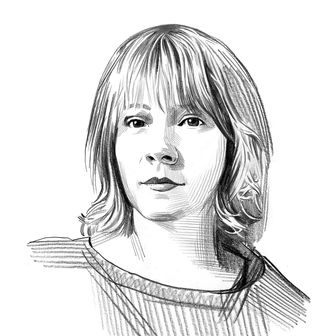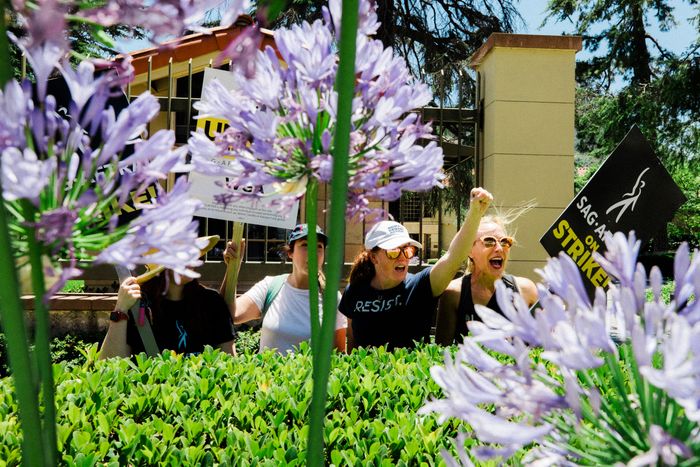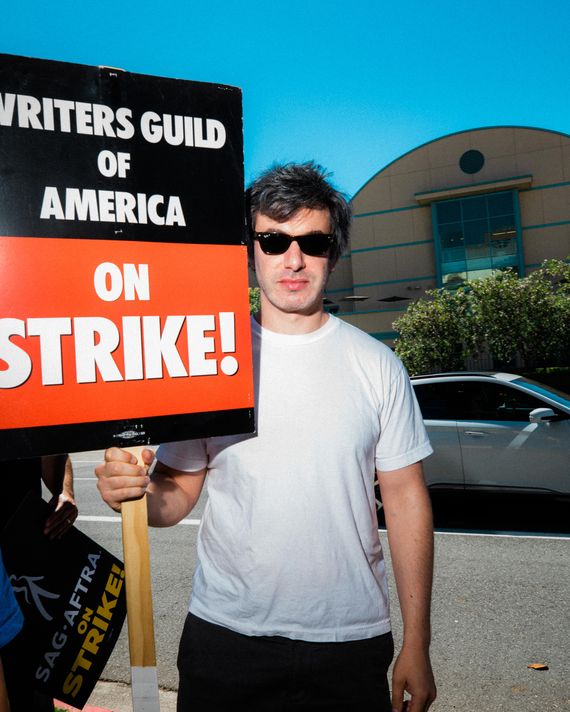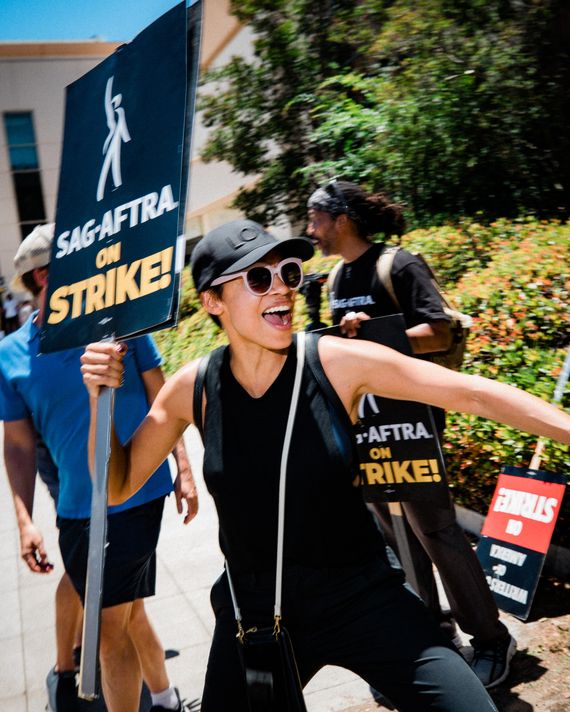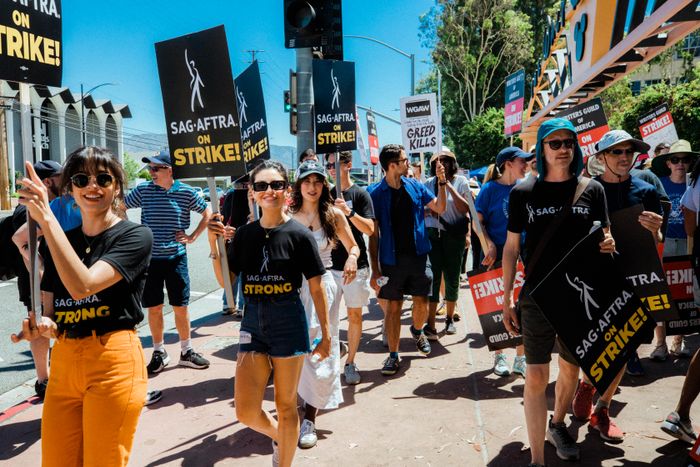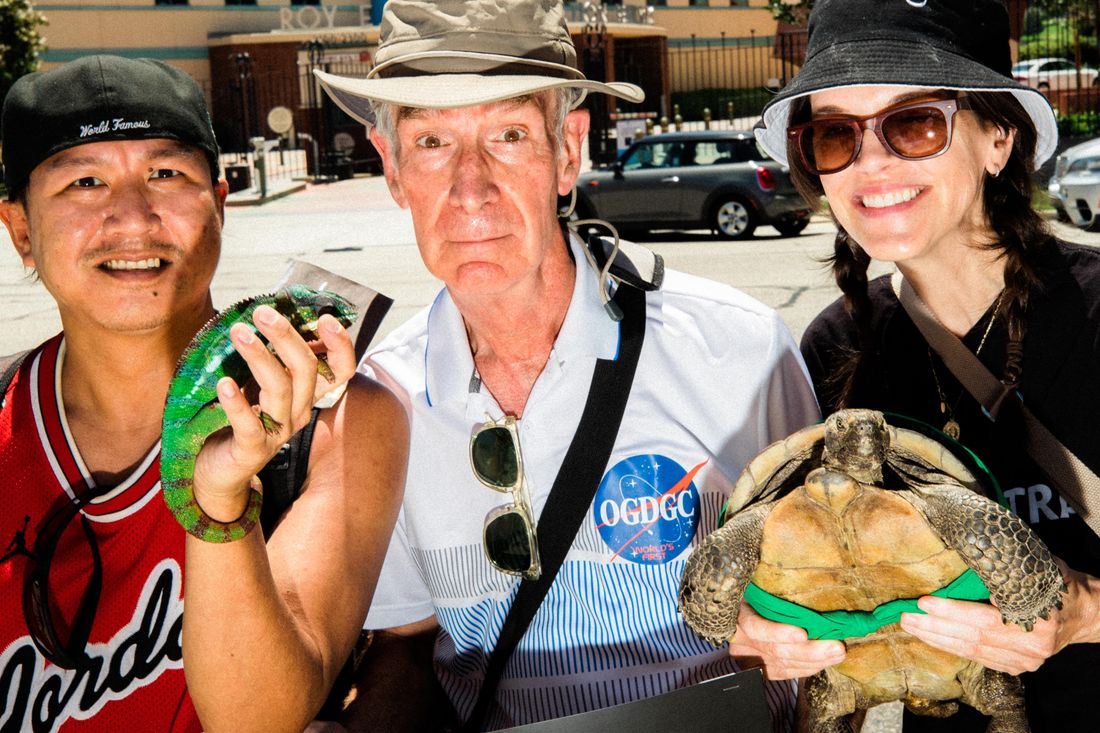
At the Warner Bros. picket line, craft services worker Jovan passed out ice cream and rainbow sherbet to strikers. “When they said they wanted to starve them out, we knew we had to feed them,” he said. The ice cream is something of a necessity. With temperatures in the low 90s, Burbank is under a heat advisory. The block is hot, but both members of the Screen Actors Guild-American Federation of Television and Radio Artists and the Writers Guild of America were out in full force Friday morning, less than 24 hours after SAG president Fran Drescher’s fiery press conference about the tense, and ultimately fruitless, negotiations with the Alliance of Motion Picture and Television Producers. Like its sister guild, SAG-AFTRA is negotiating for wage increases, better health care, and clearer guidelines around AI. Additionally, SAG actors want to establish rules around the expensive and time-consuming COVID-19-born trend of self-tape auditions. Vulture visited the pickets at Disney and Warner Bros., speaking to picketers about the issues that most concern them, body scans for AI, and how long they intend to fight for the future of their industry.
“The vibe is fantastic,” said Deric A. Hughes, a WGA board member and writer on shows like Arrow and Legacies. “We’ve been doing this [for] 74 days. This is the first time the actors have been out here. Now we’re, unfortunately, celebrating having thousands of people join the fight.” There was no difference in enthusiasm between the new SAG strikers and the veteran WGA members holding down the picket lines. Energy was high and bolstered by things like ice cream, flowers, pets, and familiar faces. At Warner Bros., two women brought dozens of bouquets and handed them out indiscriminately. One man brought his chameleon, for whom he’d fashioned a little picket sign. Both the chameleon and a turtle met Bill Nye the Science Guy at the Disney picket.
Nye was focused on the issue of health insurance, but many in the crowd were reeling from the recent revelation that the AMPTP wanted to scan actors’ faces and bodies to use their images forever. “Hands off my daughter’s face,” said Janine, mother to Australian actor and Grey’s Anatomy star Adelaide Kane. “It’s not theirs, it will never be theirs. They don’t get to just own someone in perpetuity. It’s just wrong.” Janine was in town visiting her daughter. They had set visits and a premiere on the itinerary before the strike, so now Janine (who called herself a “nepo mum”) is on the picket line in support of her daughter. “I just thought I’d get down to the picket line because they just treat you guys like dirt,” she said. When even the mums are mad, you know it’s bad.
“Fuck these people. Fuck these people who are fucking billionaires,” said comedian Jon Daly, echoing a common sentiment across conversations and picket signs all over Hollywood. “The scanning of background actors that they’re talking about today is just the beginning. And this is just the beginning of how labor will deal with AI. And this is just the beginning of our fight. We’ll continue until we get a fair deal. I’m saying very generic things, but I fully believe them.”
AI threatens not only background actors (and long-dead Batmen) but also the livelihoods of the crew that would normally support those actors. “You don’t need costumes, you don’t need PAs, you don’t need crafty, you don’t need transpo,” said actor Megan Rosati. “You don’t need the whole ecosystem of production that actors provide for everybody else.” The WGA and SAG want to get ahead of AI better than they did with streaming negotiations.
Hughes pointed out that the studios didn’t want to discuss streaming residuals in 2007. “It was like, ‘Oh, don’t worry about the internet. We don’t have to talk about it right now.’ The studios said, ‘We’ll get around to it. Let’s talk about it in three years’ time.’ And we were fortunate enough to have people in leadership and on the negotiating committee who were like, ‘Absolutely not — we’re going to talk about it today, and we’re going to resolve it today.’ And we were able to get a foothold. And what happened? The day after the strike ended, Hulu launched. Day 101, they launched Hulu. You don’t think they were working on it years before and pretending like they didn’t know what the internet was about?”
Jovan, the ice cream man, also pointed out that the Void, a virtual set used by productions like The Mandalorian, kills jobs too. “You’re getting rid of half the industry with things like the Void,” he said. “There’s all these things that they’re doing to take away positions in the industry. And once you take away all these jobs, and everything’s done by AI, who’s coming to see this stuff? Who’s coming to watch movies?” It’s an existential threat to the industry, and many actors are worried about whether jobs in the arts are even livable anymore.
“Before I came here, I dropped my daughter off at a camp nearby. Ironically, she’s doing a filmmaker’s camp,” said Veep’s Brian Huskey. “I was like, ‘Oh boy, are you sure? Just look out the window.’” Huskey has been on the picket in support of WGA, and has seen the morale boost the actors brought Friday: “I ran into a couple people who I worked with on something, and they said, ‘Oh my god, we sort of feel like it’s World War II and America showed up.’”
And just like World War II, joining the troops are movie stars. Rosario Dawson, who would normally be in full promotion mode for her roles in Disney’s Haunted Mansion, was at Warner Bros. for day one of the SAG strike. “There’s a massive labor movement that’s happening across this planet,” she said, noting how much COVID-19 upended a lot of conventional thinking. “Across industries, people are having conversations about what we can change and what we should change. Because the idea that ‘This is how it’s always been, and it can’t be any other way’ just got blown out of the water.”
“It was, what, 1980, the last time my union had a strike?” Dawson said. “And because of that, I was able to have residuals, health care, pension — things that make all sorts of difference in my life. And I got that as a teenager, getting into this industry, knowing that most people are a health scare away from being homeless. I grew up around that kind of poverty so getting insurance was key. I was able to get it for my uncle. He was a featured background actor for three days, and he has health insurance because of that. That’s the nitty-gritty stuff that we’re fighting for.”
Writer Ryan Perez noted that, as historic as this WGA/SAG team up is, it could have been even bigger. “It’s a shame the DGA is not around to participate in this part of the strike, because I feel like those three unions together could have made some good headway,” he said. But Perez isn’t daunted. “In terms of the WGA, the last big movement that a lot of the younger members were around for was the ATA dispute of about five years ago,” he said. “The WGA did wipe the floor with the agencies. That should serve as a motivation. We can win a labor movement.”


